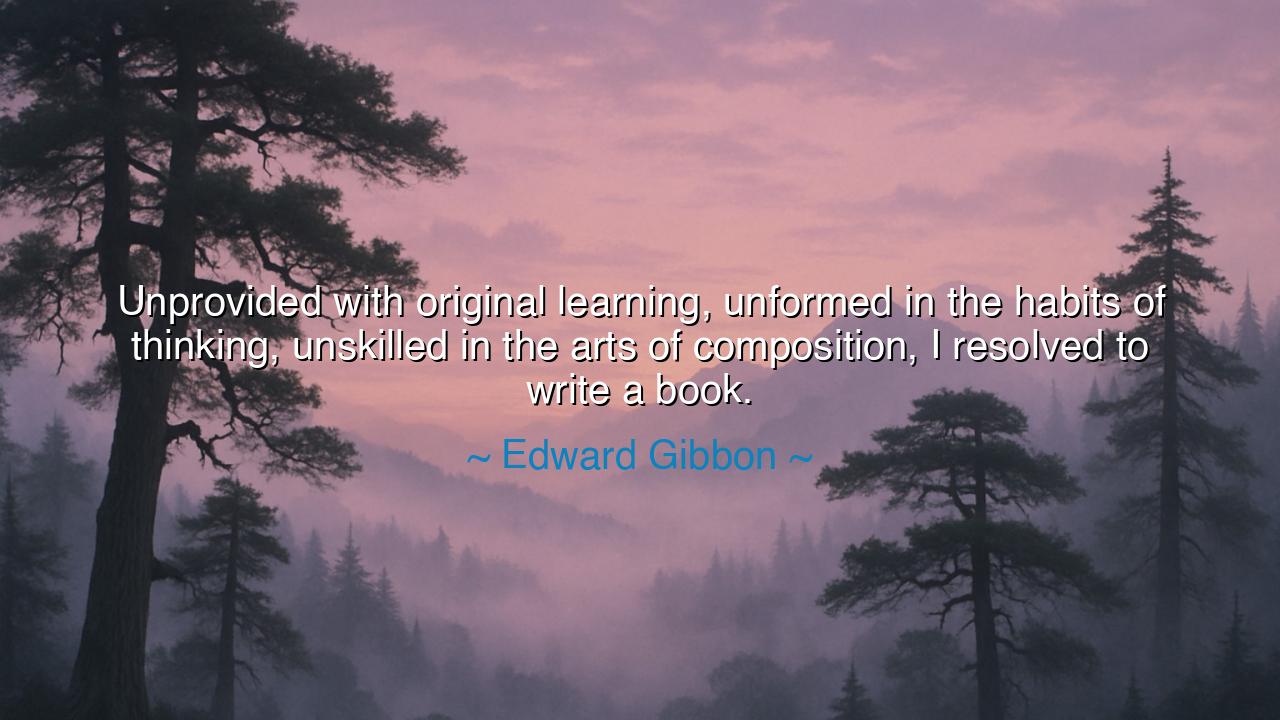
Unprovided with original learning, unformed in the habits of
Unprovided with original learning, unformed in the habits of thinking, unskilled in the arts of composition, I resolved to write a book.






When Edward Gibbon wrote, “Unprovided with original learning, unformed in the habits of thinking, unskilled in the arts of composition, I resolved to write a book,” he was not boasting of ignorance, but proclaiming the courage of beginning. His words are a confession, yes—but also a declaration of defiance against limitation. In this statement lies the eternal fire of the human spirit, the resolve to create even when one feels unworthy, to act even when unprepared. Gibbon, who would later write The History of the Decline and Fall of the Roman Empire, one of the greatest works in the English language, reveals that mastery is not a condition one waits for—it is a journey one dares to begin.
In the ancient tradition, Gibbon’s confession echoes the wisdom of the philosophers: that the first step toward greatness is humility. To admit one’s lack of knowledge is the first true act of learning. The young mind that believes itself full grows stagnant; the humble mind, aware of its emptiness, becomes fertile soil for wisdom. When Gibbon confessed himself “unskilled” and “unformed,” he was already halfway to victory—for he had overcome the most dangerous illusion of all: the illusion of sufficiency. Ignorance acknowledged becomes the seed of knowledge, while ignorance denied grows into pride and decay.
Gibbon’s words speak to all who have stood trembling at the threshold of creation. How many have dreamt of writing, painting, building, or leading, yet turned back because they deemed themselves unworthy or unready? The truth, whispered across ages by prophets and poets alike, is that no one is ever ready. The warrior becomes strong by fighting; the artist becomes skillful by painting; the writer becomes eloquent by writing. Thus, Gibbon’s declaration is not of inadequacy, but of faith—faith that the act of doing refines the doer. Courage, not perfection, is the womb of greatness.
Consider the example of Michelangelo, who when first handed a block of marble said, “I saw the angel in the stone and carved until I set him free.” He, too, began uncertainly, his early works rough and hesitant. But in chiseling stone, he chiseled his own spirit, transforming doubt into discipline. Likewise, Gibbon, untrained in the “arts of composition,” began to write—and in writing, learned to write. Through persistence, his prose would one day become a monument of thought as grand as the empire he described. The message is eternal: skill is born from struggle, and creation is the teacher of the creator.
Gibbon’s humility also carries a moral lesson for all who live in an age of pride. In a world where many speak before they think and publish before they ponder, his words remind us that true learning begins in self-awareness. To admit that one does not yet know is not weakness—it is strength. The mind that confesses its poverty becomes rich through curiosity, while the mind that pretends to wisdom remains poor forever. In Gibbon’s resolve to write despite his unpreparedness lies a quiet rebellion against fear, perfectionism, and pretense. It is as if he is saying, “I began because I desired to learn, not because I already knew.”
There is also something heroic in his statement—a defiance against the tyranny of doubt. Every great undertaking begins with imperfection. The poet writes his first line in darkness; the sailor leaves the shore before he knows the winds. Gibbon’s choice to act without mastery is a reminder that history itself is shaped by those who dared to begin before they were ready. The Romans he studied did not wait for certainty before building their empire—they learned as they conquered, adapting through triumph and failure alike. In this, Gibbon’s own life mirrored his subject: he conquered ignorance through the empire of persistence.
Let the lesson of Gibbon’s words be carried forward: Begin, though you are unready. Create, though you are uncertain. Strive, though you are afraid. The tools you lack will appear in the labor itself, and what you cannot yet do will be taught to you by the doing. The path to mastery is not paved by confidence, but by consistency. To those who hesitate at the edge of their dreams, let Gibbon’s humble yet powerful confession be your torch. Stand not still in self-doubt—resolve, as he did, to begin. For in that act of beginning, you already become what you were meant to be: a maker, a learner, a seeker of greatness born from courage.






AAdministratorAdministrator
Welcome, honored guests. Please leave a comment, we will respond soon